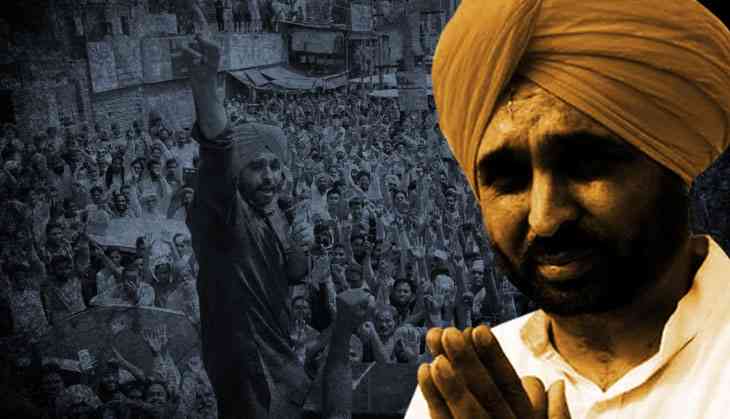AAP begins to put its house in order in Punjab, Bhagwant Mann is state chief

The Aam Aadmi Party (AAP) has taken its first major steps to set its house in order in Punjab. It has revamped its Punjab unit, and appointed Lok Sabha MP as Bhagwant Mann as its suba pradhan (state convenor).
It has also, belatedly, decided to set up a separate Political Affairs Committee (PAC) for Punjab.
By taking these steps, AAP has shown its willingness to learn the hard lessons from its defeat in the recent Assembly polls. However, AAP has ended up as the principal Opposition party in the Assembly, and if its leadership keeps its focus on the aspirations of the people, the state still has a lot to offer to it.
For Mann, it is a recognition for the efforts he put in for the party in the run up to the Assembly elections. But what follows from here is a challenging path, where he will have to deliver to keep AAP in the reckoning.
The new structure
Besides Mann, the PAC includes Aman Arora, the MLA from Sunam as seh-pradhan (co-convenor), while Sarabjit Kaur Manuke, a Dalit MLA from Jagraon, has been appointed deputy leader of the legislature party in the state Assembly.
These two appointments, approved by the party's national convenor Arvind Kejriwal, are an important balancing acts to give a face to the Hindu and Dalit support bases of the party.
These names were announced after marathon one-to-one and collective meetings with the organisational office bearers and MLAs in New Delhi on Monday. The focus of the party will now be on charting out a future road map.
Besides making these key appointments, the PAC has decided to appoint four vice-presidents in Punjab, two of whom are to be from the Malwa region and one each from the Doaba and Majha regions.
This appears to be a fallout from the analysis of the poll results, which showed that the party's strategy to rely heavily on Malwa (which has 69 of Punjab's 117 seats) boomeranged. Its presence was negligible in Majha and very little in Doaba. In order to form the government in the state, any party would require seats from all three regions because both the Shiromani Akali Dal (SAD) and the Congress have some traditional support bases in Malwa.
Division of labour
Having a separate PAC for Punjab that gives the state unit the power to take independent decisions on political affairs was a long pending issue that should ideally have been resolved much ahead of he Assembly polls.
There was a lot of resentment among the party supporters at the ground level about Delhi dictating terms. The general feeling was that the party high command thought Punjabis incapable of managing their own affairs. This was played up by both the Congress and the SAD in the run up to the polls, as the insider-versus-outsider debate raged in the AAP ranks.
The new structure, therefore, can go a long way in providing the required stability to the party and ensure that it remains well entrenched in the state.
An AAP spokesman said that now Mann, in his capacity as state convenor, would be responsible for all party affairs, while Arora would specially work to build structure of the party in state. The party would take a holistic approach towards all issues to refurbish the party base in Punjab.
The spokesperson said that AAP would launch a fresh offensive against the Captain Amarinder Singh-led Congress government, and will counter it on various promises it made during elections.
Challenges for Mann
For Mann, there are a series of challenges lined up. The very first one is taking everyone along.
There are reports of former state convenor Gurpreet Singh Waraich and senior leader Sukhpal Singh Khaira being miffed over his appointment as state chief. Khaira has reportedly asked Kejriwal to remove him from the party posts of the chief whip and spokesman.
Mann will have to placate them, as the party must go to the people as a united force.
Mann will also have to chalk out a strategy for the party's upcoming political battles. His first test will be the municipal corporation elections in the five cities of Patiala, Ludhiana, Jalandhar, Amritsar and Bathinda. Thereafter will come the bigger challenge of increasing the party's tally in the 2019 Lok Sabha polls. Having thrown up a big surprise by winning four of the 13 seats in the state during the 2014 Lok Sabha elections, AAP would want to further consolidate its position.
Above all, there is a need for the party to go back to the people, so that its brand of politics, defined by hyper-local agitations and movements, does not become dormant.
Ever since the party failed to come up with the winning tally in the Assembly polls, a large section of the party cadres have been disheartened and demoralised. The almost daily protests and interaction with the cross-section of the society on people-centric issues has come to a standstill. This is something that Mann has to revive to instill confidence in the party cadres.
He needs to tell people that becoming the main Opposition party in the state in the first attempt is no small achievement for a four-year-old force.
First published: 9 May 2017, 16:58 IST

